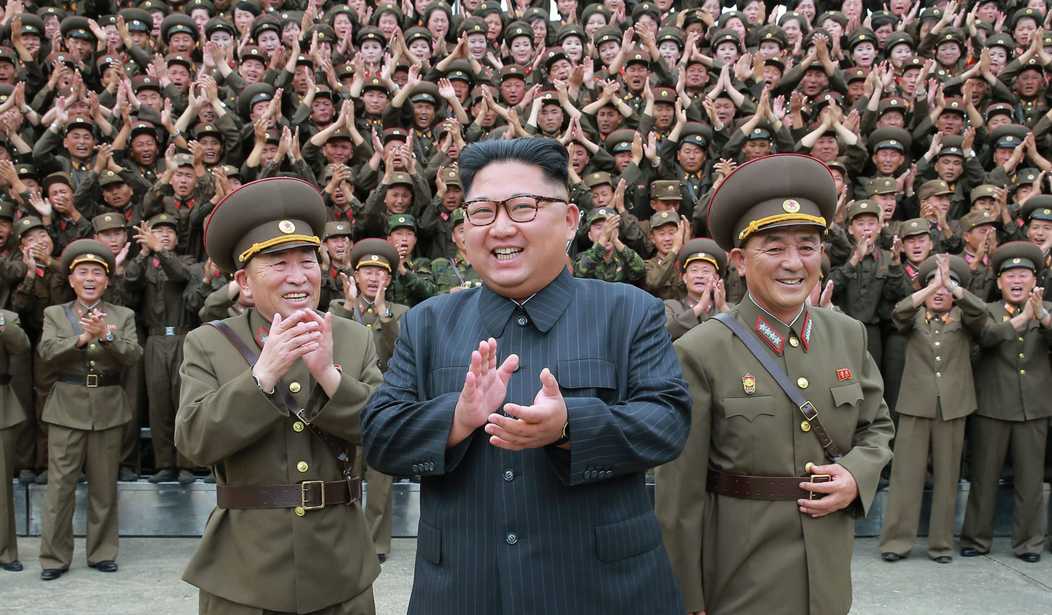It’s now two weeks since we learned that British intelligence has concluded that the North Koreans couldn’t have developed their nuclear weapons all by themselves. According to the Telegraph, “North Korean scientists are people of some ability, but clearly they’re not doing it entirely in a vacuum,” said one government minister. The two main suspects, according to the Brits, are the Iranians and the Russians.
This is not exactly breaking news. For years, I have written about the Nork/Iranian joint nuclear venture, and a long version of the story written by Gordon Chang appeared in 2015, suggesting that Iran had outsourced part of its nuclear program to Pyongyang:
The relationship between the two regimes has been long-lasting. Hundreds of North Koreans have worked at about 10 nuclear and missile facilities in Iran. There were so many nuclear and missile scientists, specialists, and technicians that they took over their own coastal resort there, according to Henry Sokolski, the proliferation maven, writing in 2003.
That’s fourteen years ago. The Iran/Nork collusion is similar to an Iran/China arrangement; there are oil-producing areas of Iran under complete Chinese control.
In other words, we’re talking about an international alliance of enemies of America. Iranian and Russian assistance to the Norks’ nuclear project are a big part of that alliance, as is Russian military action, most dramatically on the Middle Eastern battlefield. As Andrew Tabler tells us in suitably ominous tones, Russian-led and -supplied forces, in conjunction with Iranian forces and proxies, just crossed the Euphrates, bringing the enemy alliance closer to conflict with our guys:
In addition, the crossing brings Iran one step closer to its stated goal of creating a land bridge between Iraq and Syria, giving the Islamic Republic another avenue through which to place troops and weapons on the borders of U.S. allies. Tehran has steadily worked toward that goal even as Israel reached a de-escalation agreement in southwestern Syria designed to keep Hezbollah and other Iranian-supported militias a few kilometers away from the Golan Heights frontier.
Remember that the Russians entered the Syrian battlefield after the Iranians begged them for help. Without Russian air power and ground forces, Iran would likely have lost, Assad would have fallen, and the Middle East would be less threatening to our interests than it is today.
Those of a certain age may recall that President George W. Bush delivered a State of the Union address after 9/11, in which he spoke of an “Axis of Evil” comprised of Iran, Saddam Hussein’s Iraq, and North Korea. Many were baffled at the Norks’ inclusion. Was it an effort at ethnic balance, or what? But we now see that W. was right; North Korea has been deeply involved in the enemy alliance all along.
Iraq has dropped out, although it is increasingly beholden to Tehran. It may yet return to full status in the Evil Axis. And, as President Trump duly noted in his UN speech, there’s also Venezuela, here in our own hemisphere.
The president did well, I thought, to stress that Iran, North Korea, and Venezuela all brutally oppress their own people, whom the Iranian, Korean and Venezuelan tyrants mortally fear. Indeed, Trump was just one small logical step away from the proper strategic conclusion: since those enemies of ours fear their own people almost as much as they fear American military power, we should actively, publicly, and creatively support the internal opposition in all three countries.
But although Trump’s words certainly point in that direction, he has neither called for us and our allies to support internal opposition, nor has he come right out and called for regime change. Why not?
First of all, because his top three national security officials—Secretary of Defense James Mattis, National Security Adviser H.R. McMaster, and Secretary of State Rex Tillerson—oppose such a policy. They are more inclined to look for either a military “solution” or to impose crushing sanctions.
Second, none of the top policy makers sees the enemy alliance as a global threat. They think case-by-case, trying to devise separate “solutions” for each enemy.
I think they are wrong in both instances. I think Kim, Khamenei and Maduro, along with Putin and Assad, are right to fear their own people. And I am convinced that revolution is more likely to advance our interests than are military surges or economic sanctions.
Trump has promised to announce a new Middle East (mostly Iran) policy shortly. Some smart people think he’s going to call for support to the oppressed people. I would be thrilled if that happened, but doubt it will.
Hold your breath.









Join the conversation as a VIP Member